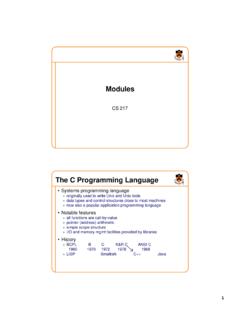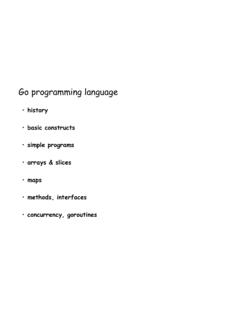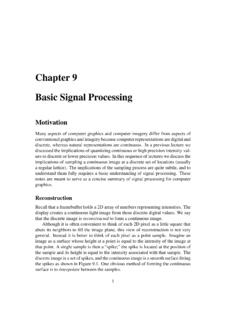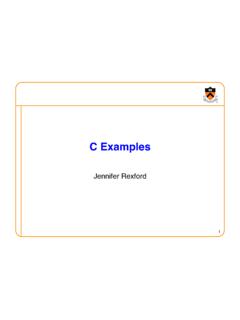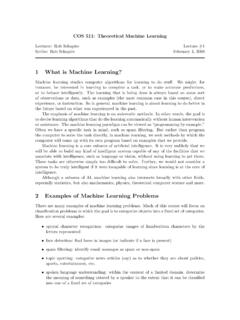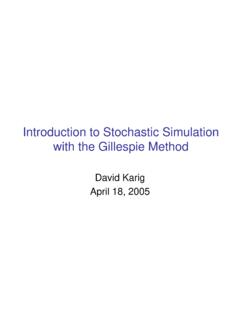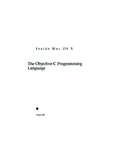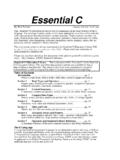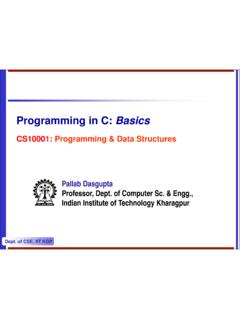Transcription of C Examples - cs.princeton.edu
1 1 C Examples !Jennifer Rexford!2 Goals of this Lecture ! Help you learn about:! The fundamentals of C! Deterministic finite state automata (DFA)! Expectations for programming assignments! Why?! The fundamentals of C provide a foundation for the systematic coverage of C that will follow! DFA are useful in many contexts ( , Assignment 1)! How?! Through some !3 Overview of this Lecture! c programming Examples ! Echo input to output! Convert all lowercase letters to uppercase! Convert first letter of each word to uppercase! Glossing over some details related to pointers ! .. which will be covered subsequently in the course!4 Example #1: Echo Input to Output! Include the Standard Input/Output header file ( )!#include < >! Make declarations of I/O functions available to compiler!
2 Allow compiler to check your calls of I/O functions! Define main() function!int main(void) { .. } int main(int argc, char *argv[]) { .. } Starting point of the program, a standard boilerplate! Hand-waving: argc and argv are for input arguments!5 Example #1: Echo Input to Output! Read a single character!c = getchar(); ! Read a single character from the standard input stream (stdin) and return it! Write a single character!putchar(c); ! Write a single character to the standard output stream (stdout)!6 Putting it All Together!#include < > int main(void) { int c; c = getchar(); putchar(c); return 0; } Why int instead of char?!Why return a value?!7 Read and Write Ten Characters! Loop to repeat a set of lines ( , for loop)! Three expressions: initialization, condition, and increment!
3 , start at 0, test for less than 10, and increment per iteration!#include < > int main(void) { int c, i; for (i=0; i<10; i++) { c = getchar(); putchar(c); } return 0; } Why not this instead:!for (i = 1; i <= 10; i++)!8 Read and Write Forever! Infinite for loop! Simply leave the expressions blank! , for ( ; ; ) !#include < > int main(void) { int c; for ( ; ; ) { c = getchar(); putchar(c); } return 0; } When will this be executed?!How would you terminate this program?!9 Read and Write Until End-Of-File! Test for end-of-file! EOF is a global constant, defined in ! The break statement jumps out of the innermost enclosing loop!#include < > int main(void) { int c; for ( ; ; ) { c = getchar(); if (c == EOF) break; putchar(c); } return 0; } do some stuff done yet?
4 Before the loop do more stuff after the loop 10 Many Ways to Do the Same Job!for (;;) { c = getchar(); if (c == EOF)! break; !putchar(c); }!for (c=getchar(); c!=EOF; c=getchar()) ! putchar(c); while ((c=getchar())!=EOF) putchar(c);!Typical idiom in C, but messy side-effect in loop test!c = getchar(); while (c!=EOF) { ! putchar(c); c = getchar(); } Which approach is best?!11 Review of Example #1! Character I/O! Including Functions getchar() and putchar() Representation of a character as an integer! Predefined constant EOF Program control flow! The for and while statements! The break statement! The return statement! Operators! Assignment operator: = ! Increment operator: ++! Relational operator to compare for equality: ==! Relational operator to compare for inequality: !
5 =!12 Example #2: Convert Uppercase! Problem: Write a program to convert a file to all uppercase! Leave non-alphabetic characters alone! Program design:!repeat Read a character If unsuccessful, break out of loop If the character is lower-case, convert to upper-case Write the character 13 ASCII!American Standard Code for Information Interchange! 0 1 2 3 4 5 6 7 8 9 10 11 12 13 14 15 0 NUL SOH STX ETX EOT ENQ ACK BEL BS HT LF VT FF CR SO SI 16 DLE DC1 DC2 DC3 DC4 NAK SYN ETB CAN EM SUB ESC FS GS RS US 32 SP ! " # $ % & ' ( ) * + , - . / 48 0 1 2 3 4 5 6 7 8 9 : ; < = > ? 64 @ A B C D E F G H I J K L M N O 80 P Q R S T U V W X Y Z [ \ ] ^ _ 96 ` a b c d e f g h i j k l m n o 112 p q r s t u v w x y z { | } ~ DEL Lower case: 97-122 and upper case: 65-90!
6 , a is 97 and A is 65 ( , 32 apart)!14 #include < > int main(void) { int c; for ( ; ; ) { c = getchar(); if (c == EOF) break; if ((c >= 97) && (c < 123)) c -= 32; putchar(c); } return 0; } Implementation in C!15 That s a B-minus! A good program is:! Clean! Readable! Maintainable! It s not enough that your program works!! We take this seriously in COS 217!16 #include < > int main(void) { int c; for ( ; ; ) { c = getchar(); if (c == EOF) break; if ((c >= 97) && (c < 123)) c -= 32; putchar(c); } return 0; } Avoid Mysterious Numbers!Ugly;!ASCII only!17 #include < > int main(void) { int c; for ( ; ; ) { c = getchar(); if (c == EOF) break; if ((c >= a ) && (c <= z )) c += A - a ; putchar(c); } return 0; } Improvement: Character Constants!
7 Better; but assumes that alphabetic character codes are contiguous!18 Standard C Library Functions ctype(3C) NAME ctype, isdigit, isxdigit, islower, isupper, isalpha, isalnum, isspace, iscntrl, ispunct, isprint, isgraph, isascii - character handling SYNOPSIS #include < > int isalpha(int c); int isupper(int c); int islower(int c); int isdigit(int c); int isalnum(int c); int isspace(int c); int ispunct(int c); int isprint(int c); int isgraph(int c); int iscntrl(int c); int toupper(int c); int tolower(int c); Improvement: Existing Functions!DESCRIPTION These macros classify character-coded integer values. Each is a predicate returning non-zero for true, 0 for The toupper() function has as a domain a type int, the value of which is representable as an unsigned char or the value of If the argument of toupper() represents a lower-case letter.
8 The result is the corresponding upper-case letter. All other arguments in the domain are returned unchanged. 19 Using the ctype Functions!#include < > #include < > int main(void) { int c; for ( ; ; ) { c = getchar(); if (c == EOF) break; if (islower(c)) c = toupper(c); putchar(c); } return 0; } Returns non-zero!(true) iff c is a lowercase!character!20 % ls % gcc217 o upper % ls upper % upper We ll be on time today! WE LL BE ON TIME TODAY! ^D % Building and Running!21 % upper < #INCLUDE < > #INCLUDE < > INT MAIN(VOID) { INT C; FOR ( ; ; ) { C = GETCHAR(); IF (C == EOF) BREAK; IF (ISLOWER(C)) C = TOUPPER(C); PUTCHAR(C); } RETURN 0; } Run the Code on Itself!22 % upper < > % gcc217 o junk :1:2: invalid preprocessing directive #INCLUDE :2:2: invalid preprocessing directive #INCLUDE :3: syntax error before "MAIN" Output Redirection!
9 23 Review of Example #2! Representing characters! ASCII character set! Character constants ( , A or a )! Manipulating characters! Arithmetic on characters! Functions like islower() and toupper() Compiling and running C code! Compile to generate executable file ! Invoke executable to run program! Can redirect stdin and/or stdout!24 Example #3: Capitalize First Letter! Capitalize the first letter of each word! cos 217 rocks Cos 217 Rocks ! Sequence through the string, one letter at a time! Print either the character, or the uppercase version! Challenge: need to remember where you are! Capitalize c in cos , but not o in cos or c in rocks ! Solution: keep some extra information around! Whether you ve encountered the first letter in the word!
10 25 Deterministic Finite Automaton!Deterministic Finite Automaton (DFA)!1!2!letter!(print uppercase equivalent)!letter!(print)!not-letter!(p rint)!not-letter!(print)! States! Transitions labeled by characters (or categories)! Optionally, transitions labeled by actions!Actions are not!part of DFA formalism;!but they re helpful!26 #include < > #include < > int main (void) { int c; for ( ; ; ) { c = getchar(); if (c == EOF) break; <process one character> } return 0; } Implementation Skeleton!27 <process one character> = switch (state) { case 1: <state 1 action> break; case 2: <state 2 action> break; default: <this should never happen> } Implementation!if (isalpha(c)) { putchar(toupper(c)); state = 2; } else putchar(c); if (!)
